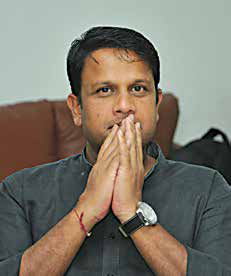Issue No.22 / January 16-31,2016

Meet Saharsh David, CSR Head of the 165-year-old multinational company, Sandvik Asia, who shared his knowledge and experience on the importance of Corporate Social Responsibility (CSR) in the corporate sector. He also threw light on the CSR function in India and around the world, and presented a different theory of the CSR activity, giving a comprehensive idea of the same
CSR activities should be carried out by companies to minimise the negative environmental impact. If you see, every organisation/company does create some or the other business/activity that has a negative impact on the economic, social and environment, as a whole. For instance, a company that deals with iron or water, draws water from nature, thereby creating some negative impact on nature and our environment. Thus, in a bid to nullify this negative impact of our work on the environment, the role of CSR is very important. With the help of CSR, corporates and firms will learn to get more ethical. One should approach CSR as a strategic way to sustainability and eliminate the ill-effects from the society. Quoting an example of the Tatanagar project, David noted that the project has not only worked for the community as a whole, but has also participated in systematic building of the city.

It is imperative to understand that community social responsibility for the corporate is not to be confined to the idea of doing your bit for the society. The concept of CSR involves a hitherto less considered issue of the negative impact made on the environment, be in the form of geography, atmosphere, people or the existing system involving all these, and the initiative, planning and the process of converting that into a positive one, or limiting its negative effects to the extent possible.
You have to honestly and carefully consider the negative impact your operations are making on the nature. Then the CSR activity on your part should be aimed at turning that negative into a positive one, or make for the losses the processes have incurred. It goes without saying that when you do that in an ethical manner, you consider the true environmental cost that you need to pay, not the superficial, temporary, economical measures. However, the question is, are we ready to follow this way and implement it as well honestly?
Also, the approach to CSR activities involving the society should be, to work for community as part of community, not as an outsider. It is not that you are handing down something as a benefactor. Whatever activity you are taking up, it should be remembered, is going to help the society, which is the part of the ecosystem in which you company exists. So whatever is good for the ecosystem, it is going to help your company as well, in some way or the other. One can consider such initiatives as improving or enhancing your infrastructure, at large. Your reaching out to the society should be like a bridge, with interaction taking place from both sides, witnessing progress taking place through an opportunity of transportation it provides. Remember, your actions in this regard should be planned and executed in such way that these should get you something worthwhile in return, albeit not in material terms always.
In a conversation with Corporate Citizen, David, an engineer by profession, spoke at length about his professional life, importance of CSR in today’s times, challenges involved, while also lending a piece of advice to today’s young managers.
I am currently heading the CSR division for Sandvik Asia. I didn’t exactly start out as a corporate person. In fact, I was a lecturer and an editor for some time. Thereafter, I got into the media industry and later decided to join the corporate world. I was working with a German company, Praja Foundation, but now I am associated with Sandvik Asia.
We don’t have a CSR department as such; but have ‘Sustainability Business’ concept and that is the department I represent. In India, it is called CSR. We ensure that there are no mistakes made in any of the related aspects such as security, financial and so on. We try and ensure that we should be more ethical. We are operating in and around 120 countries and working in different sectors such as mining, construction and engineering. The idea is to reduce this negative impact arising out of the businesses carried out by us.
CSR can involve charity and I am not against charity. All I am trying to say is that you should become more strategic. You need to create a programme that is close to your brand, product and customers and close to your operation.
Yes, sustainability of business is important. But the focus should be on how you ensure the minimisation of negative impact. Also, you should be ethical in your work.
Yes. Use it to convert the things in your positive impact. If you are using these things to change negative impact into positive impact then it will support your brand for sustainability.
You need to have the wisdom to use that knowledge. Knowledge is a different thing, and the wisdom to utilise that knowledge is a different thing. The decision is never wrong, but the consequences of the decision can be wrong. Consequences are based on your wisdom. So basically it’s up to you
Yes, getting your basics clear, that’s the definition. And it’s not that you’re not good. You can see your organisation is good, but while investing your profit do take a look at other sections of the society as well.
If a society has corruption then instead of a good policy on corruption, you need to go in for anti-corruption, which is a good cause. That correlation is important and that is the CSR. When it comes to corporate, my idea and understanding about education is completely different. Instead of coming up with more business schools, corporates should look at what they can gift to the education system. Are we ensuring that technology is the culture of critical thinking? I think we can do it, but we are not doing it. So instead of donating money we shall do these things to impact the education system positively. If you see, different countries carry out different CSR activities. For instance, in the US, they have voluntary involvement in such programmes.
I play cricket on every Saturday and Sunday. I also like to cook.
I think today’s youth have the information and are very well versed with whatever is happening around them, thanks to technology. But they also think that information is everything... According to me, they should understand that just having information does not make you anything. You need to have the wisdom to use that knowledge. Knowledge is a different thing, and the wisdom to utilise that knowledge is a different thing. The decision is never wrong, but the consequences of the decision can be wrong. Consequences are based on your wisdom. So basically it’s up to you.
Trust is an important thing and as corporate entities operate in the public domain, trust-building measures and openness is necessary. At the end of the day, it is all about the people and not just about money. People should be given top-most priority. If your people are leaving you, then what’s the point of having money?
By Mukul Potdar